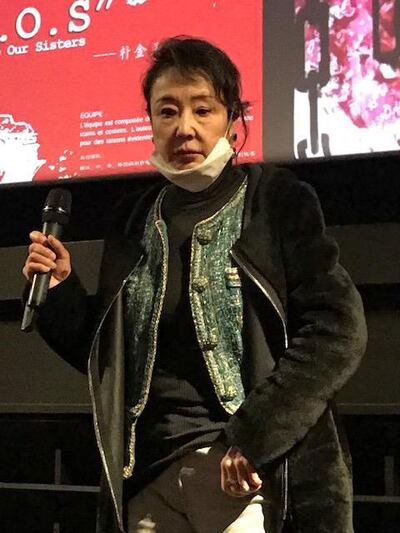Authorities in China have painted over a mural and deleted accounts and memes supporting the woman found chained by the neck in the eastern province of Jiangsu, as internet users used her image to mark International Women's Day.
A mural painted on the outside of a building in Benxi city, in the northeastern province of Liaoning, featuring an image of the woman from Jiangsu's Feng county known as Yang Qingxia, alongside the word "freedom."
An investigation by Jiangsu provincial authorities said Yang was a missing woman known by the nickname Xiaohuamei who was trafficked out of the southwestern province of Yunnan in 1997 and sold twice by human traffickers in Feng county. Nine people have been arrested for crimes linked to her trafficking, including her "husband," who was identified by his surname, Dong.
Harrowing video footage of Yang, who is believed to have given birth to eight of Dong's children, chained by the neck in an outbuilding went viral in China last month, prompting widespread public anger over the rampant trafficking of women and girls, aided and abetted by local ruling Chinese Communist Party (CCP) officials.
The artists who made the mural, known by their online nicknames @Jorsin- and @revos_one, had their accounts muted, with no content visible on Tuesday.
Internet users on Tuesday reposted photos and text about the "Feng county mother of eight," to call attention to the lack of respect for women's rights in contemporary China.
"The case of the chained woman hasn't been resolved openly and transparently, despite all of the comments it received online," Wang Qingpeng posted on overseas social media. "In an online call for International Women's Day, please comment and leave a message below this tweet."
Internet user jason hu@jason27873170 wrote: "Today, we're not celebrating International Women's Day, because we don't even know if the woman in chains is dead or alive, and women and children continue to be abducted."
"The law has been unable to eradicate this dark cancer in our society, which is very deep-rooted," the user wrote. "The irony is that ... International Women's Day was initiated under socialism ... and yet the end result of several decades of socialism is that women are being chained up."

Disappearances reported
The user added that "a large number" of people who spoke out about the Feng county scandal had been called in to "drink tea" with the state security police, or just disappeared.
Beijing-based rights activist Ni Yulan said she still worries about Yang.
"I'm concerned about her too," she said. "I saw someone with a chain around their neck and a lock, engaging in performance art [posting it online]."
"I have also seen a lot of paintings, all kinds of them, and I have also forwarded them."
Ni said Yang had lost most of her life to the trafficking gangs and her abusive husband and his family.
"She was unable to live a normal life for 26 years," she said. "She was abducted when she was still so young, and has gone through so much suffering."
"We didn't even have the opportunity to hear her speak," Ni said.
Hubei rights activist Wu Lijuan said many online activists had switched their usual avatar for one depicting the chained woman.
"We need to learn the truth about what happened, if we are to protect everyone," Wu told RFA. "Without that ... there will be no safety or security for any Chinese woman."
Independent journalist Gao Yu added: "Even the Winter Olympics and Russia's war of aggression against Ukraine haven't detracted from the attention of the Chinese public and the rest of the world on the case of the chained woman."
"It's not going to be fixed by the ministry of public security simply announcing a special campaign against the trafficking of women and children," she told RFA, calling on China's rubber-stamp parliament, the National People's Congress (NPC), to take concrete action.
'SOS (Save our Sisters)'
Meanwhile, Chinese film director Hu Xueyang screened a new film on Monday to mark International Women's Day in Paris, supported by Chinese-American writer Yang Geling, her husband Lawrence Walker and Germany-based artist and writer Yoyo.
The film tells the story of a woman who escaped from North Korea and lived in hiding in northeastern China. But instead of being rescued by South Koreans as they had hoped, they wound up in the hands of a trafficking gang.
Forced to become a sex worker in a hair salon, the heroine meets a man who falls in love with her and wants to rescue her. Despite warnings, he goes under cover to discover a number of shady stories at the crossover between the trafficking and organ-smuggling gangs and the corrupt local police officers who collude with them.
The film ends as a North Korean agent posing as a South Korean missionary escorts the heroine back to North Korea, as she sings a North Korean folk song, "The Ballad of Kikyo," moving the agent to the extent that he takes off her handcuffs.
Poet Yang Lian read out a poem written for the Jiangsu chained woman at the film's premiere.
"Please delete the word mother in Chinese," the poem reads. "Because mother has been chained, dragged ... raped, injured, soiled, ruined, hollowed out, trampled, left cold and hungry, bullied, mutilated, consumed, destroyed and discarded."
Hu arranged the screening as a form of protest at the treatment of Yang Qingxia, according to the event invitation.
Translated and edited by Luisetta Mudie.

